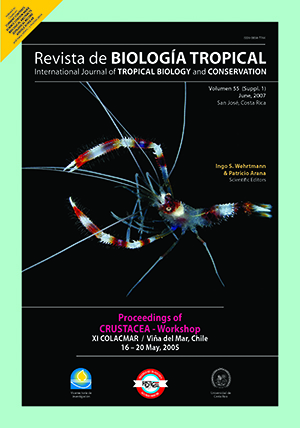Resumen
We analyzed the morphological and functional state of hepatopancreas in Palaemonetes argentinus from two environments with different pesticide concentrations. Los Padres lagoon (Argentina) is an area subjected to contamination due to the slow exchange of water, the shallow depth and the input of contaminated water. Prawns living in this lagoon accumulate high amounts of organochlorine pesticides in their tissues. Hepatopancreas of prawns from Canal 5, an adjacent shallow stream where the amount of pesticides is below toxic levels, and from Los Padres lagoon were processed by standard histological techniques with light microscopy and transmission electronic microscopy. At Los Padres lagoon, we found important tissular alterations, such as intertubular infiltration of haemocytes and connective tissue, epithelial retraction in some tubules, and a folded basal lamina. Important necrotic desquamation, with cariolysis, cariorrexis and lack of cellular details were also observed. Numerous tubules presented an enlarged and irregular lumen with the epithelium atrophied or completely absent. In general, the lesions were particularly located in the medullar region of the organ. At the ultrastructural level, R and F cells were the most damaged. Both cell types had nuclear retraction, chromatin condensation and cytoplasmic lysis. Some R cells also had dilated mitochondria and numerous lysosomes, and the basal cytoplasm was nearly completely lysed. The hepatopancreas of prawns from Canal 5 did not evidence any alterations. The histopathological study of the hepatopancreas is a highly sensitive tool to evaluate the physiological condition of prawns and water quality. Other environmental conditions were similar, so it can be assumed that pollutants were the main cause of organ deterioration.##plugins.facebook.comentarios##

Esta obra está bajo una licencia internacional Creative Commons Atribución 4.0.
Derechos de autor 2007 Revista de Biología Tropical
Descargas
Los datos de descargas todavía no están disponibles.


